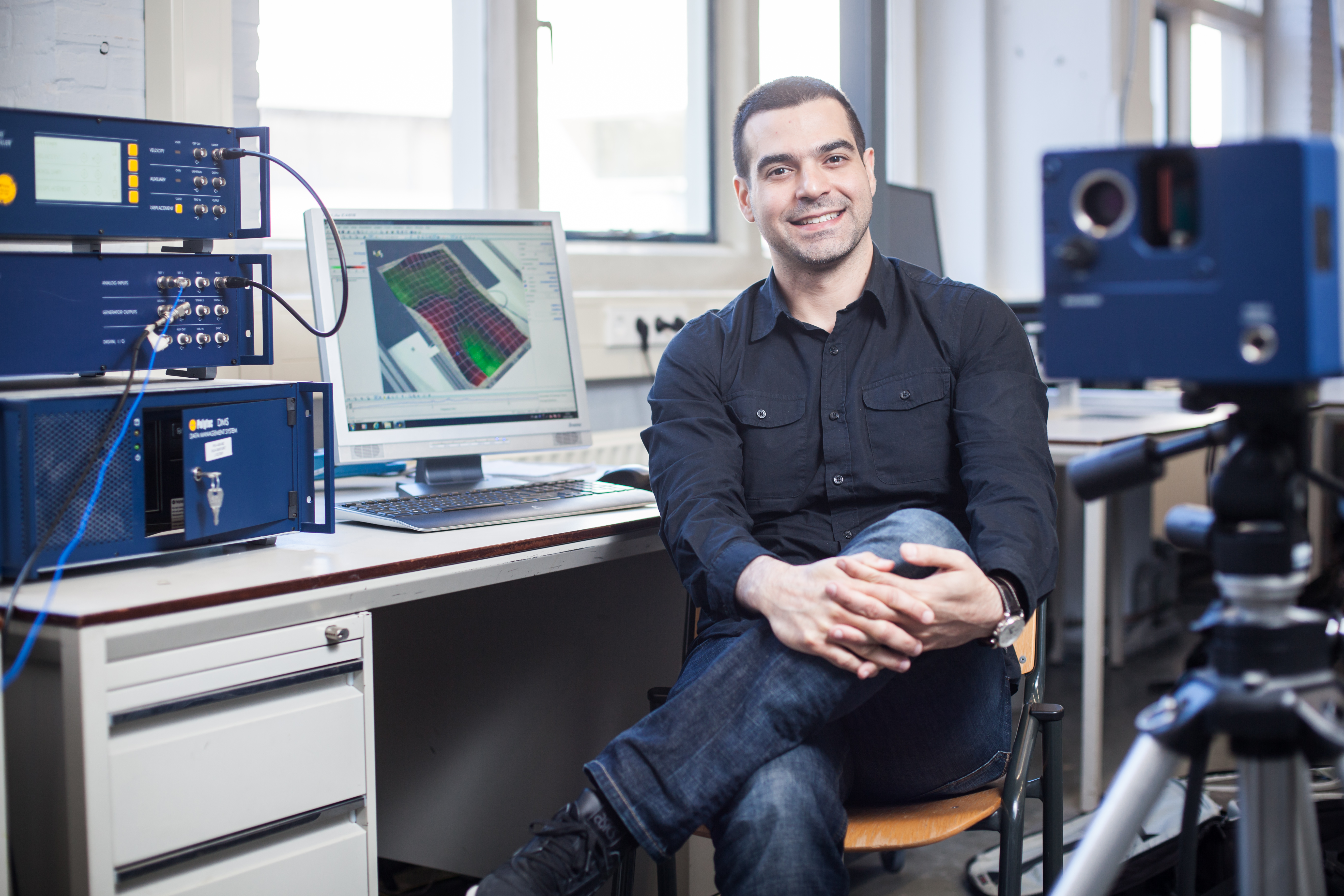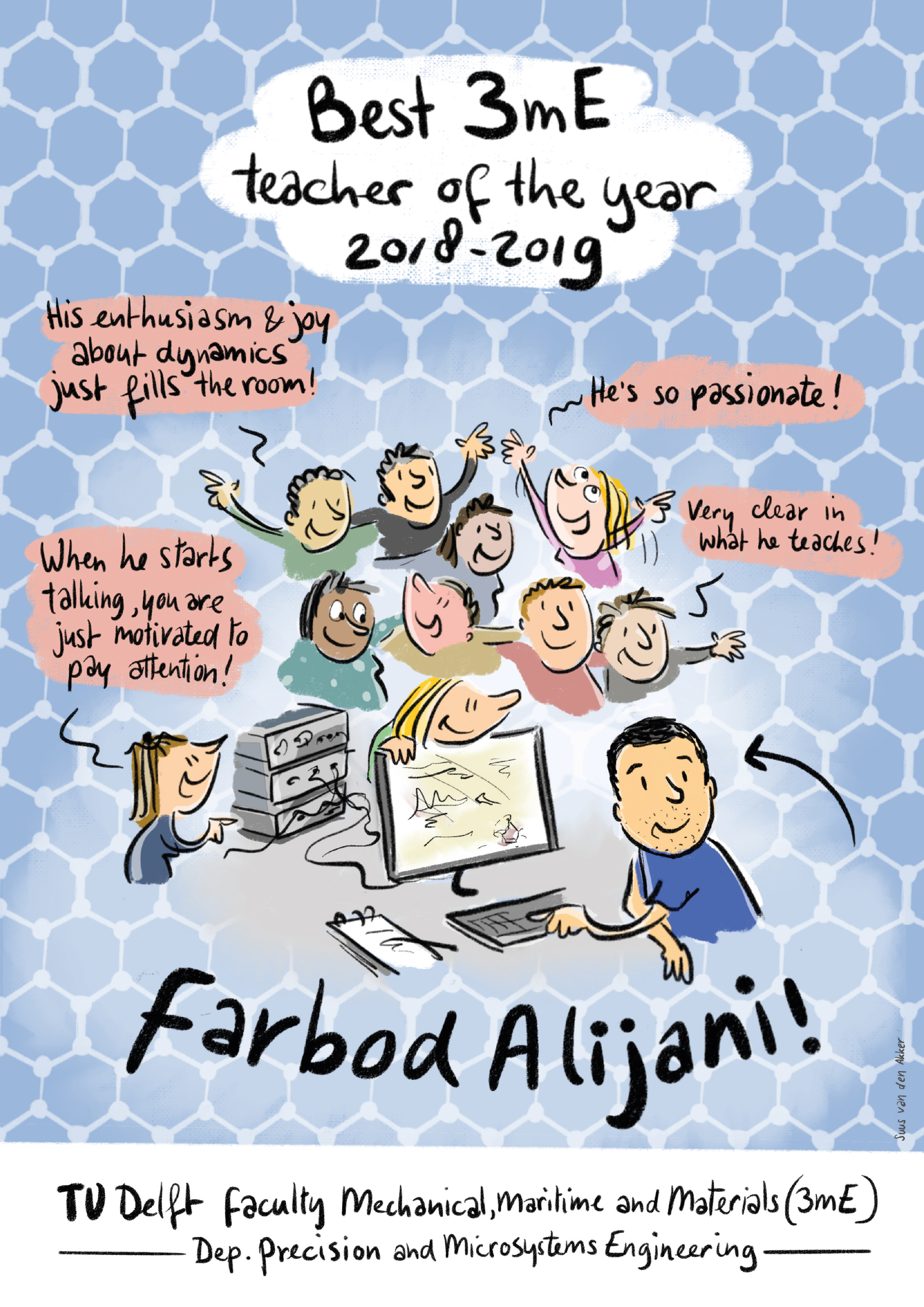Best lecturer of the year 2018-2019
All students from the 3mE faculty have had the opportunity to vote for the best lecturer of the academic year 2018-2019. This award enables them to pay tribute to lecturers and show their appreciation for the unique and creative way in which they teach their classes. The 3mE faculty holds these nominations in high esteem: indeed, good lecturers are vital to the quality of 3mE’s academic programmes.
The student associations at 3mE – Variscopic, Froude and Leeghwater – have based their awards for best lecturers in each programme on the questionnaire results. As icing on the cake, they have also chosen the best lecturer of the entire 3mE faculty. After all of the faculties have selected their best lecturers, there will also be a nomination round for ‘Best lecturer at TU Delft in 2019’.
Farbod Alijani best 3mE lecturer
No one attending Farbod Alijani’s classes in the Department of Precision and Microsystems Engineering (PME) is ever at risk of being bored for a single minute. Even though Alijani’s programme requires students to make demanding calculations, his students always tackle them with enthusiasm because he is so adept at bringing the material to life.
The first thing that stands out in the students’ evaluations of Farbod Alijani is his passion for the subjects in the Mechanical Engineering master programme (the Biomechanical Engineering, High-Tech Engineering and Opto-Mechatronics tracks). ‘When he starts talking, then you are always motivated to pay attention because he is so enthusiastic,’ one of his students writes. ‘He does everything by heart, none of this boring scribbling that you have to read off a piece of paper. He explains everything in great detail, until you understand it.’ Even though his pace is challenging at times, as a student you always want to join in. ‘Because he explains everything in such an animated way.’ Another student writes: ‘His enthusiasm and pleasure in dynamics simply fill the room.’ ‘He talks about his subject matter with such passion, and he knows how to convey that to us.’
Passion
Alijani beams when he hears what the students have written about him. ‘It makes me happy to hear that they appreciate my passion for the subject and my way of teaching,’ he says. Where exactly does this passion come from? ‘Actually I have always been extremely fond of teaching,’ Alijani says. He was already teaching in his country of birth, Iran. He was especially drawn to the interaction with the students. That is why he also started to teach right after moving to Canada. That was stressful and took some getting used to at first. ‘In Iran I did everything in Farsi, and suddenly I had to do everything in English. That was difficult in the beginning.’ But at a certain point he got the hang of it, and one day he received a request from a Canadian colleague’s students: could Alijani come to their class to teach, because they preferred him? Afterwards he was applauded. ‘That really felt like a reward. It gave me immense pleasure.’
His secret recipe for a good class: identify with the students. Every time he does something, he tries to put himself in his students’ shoes. ‘Imagine, it is Monday and they all went out this weekend and are therefore still tired. How can I make sure that I keep their attention during class and get them to participate enthusiastically?’
Common ground
To get their attention, he might use a slinky, for example, to show them that you can make it move in many different ways. Or he may treat his students to a video showing several metronomes that all start to move at different times. They tick away at a different tempo for a while, until at a certain point they all move in unison. ‘You could choose to explain this using fairly complex mathematical calculations. But that does not work so well if students have been partying the night before. You have to introduce it “smoothly”, explain it with the help of a video, for example. Students will understand the material much better that way, and they find it more interesting as well.’
He also looks for a subject with which the students have some common ground, such as a bicycle or a car. People at the PME department where Alijani works deal with extremely small nanoparticles, and it is tricky to kindle enthusiasm about this to students from different disciplines. ‘But everyone in the Netherlands has a bike, so that is a useful example for explaining the theory. And they can immediately test it in real life, on their own bikes.’
Involvement
Alijani did not have the good fortune of having a huge role model when it comes to teaching. When he was being taught, there were no professors who identified with their students as he does. ‘My teacher wrote all kinds of formulas on the blackboard in a hurry, and I had to do my utmost to take quick notes. But it did make me think: later on I am going to do that much differently. If you want students to properly understand a concept, then you have to be able to apply it to a problem in the real world and really involve them.’
He learns a great deal from his students as well. ‘I encourage them to ask me questions, because that, in turn, gets me thinking.’ For example, there was a student who came up with an idea for a running robot, something Alijani had absolutely no experience with himself. As a result, he had to think about the theory as well, together with his student. ‘It was great to see how involved he was. Not only does it increase the students’ knowledge, but mine too.’ The robot is not running yet, it is still crawling, Alijani laughs. ‘But it will run in the future, I am sure of that!’
-
Student association Leeghwater wants to use the ‘Best lecturer of the year’ award to involve more students in education. The association also hopes to encourage lecturers to improve their teaching even more, so that perhaps next year they will win the best lecturer of the year award.
First year: Matthijs Langelaar devotes a great deal of time to preparing his material, which has not gone unnoticed among his students. ‘He is also aware which parts of the material students find difficult and adapts his lesson accordingly.’
Second year: Roeloef Koekoek is unbelievably passionate and enthusiastic, his students write, explaining why they chose him.
Third year: Paul Breedveld explains the material to his students in a fun way, using examples from practice that appeal to most Mechanical Engineering students. He conveys it with beautiful slides, a clear story and a solid structure.
Mechanical Engineering
- Energy & Process Technology: Daniël Tam is an extremely effective lecturer, according to his students. ‘His notes provide us with enough to fully grasp the complex concepts.’ Even students who have no background in Fluid Dynamics understand the theory thanks to his lectures.
- Multi-Machine Engineering: Xiaoli Jiang
- High-Tech Engineering & Opto-Mechatronics: Farbod Alijani is the winner of the award for overall best lecturer in the 3mE faculty. His students think he is a wonderful lecturer, because he teaches every class with passion, likes to answer questions, but at the same time remains formal and strict.
The response was too low for the Vehicle Engineering mastertrack to choose a best lecturer.
Systems and Control: Tamás Keviczky is appreciated by his students for his clear explanations and perfect structure. His theoretical knowledge in the lectures is outstanding, according to the students.
Materials Science and Engineering: Wim Sloof is enthusiastic when he teaches, and his lectures are interspersed with amusing anecdotes and metaphors. ‘You can feel his passion for the subjects he teaches, and at the same time he ensures that we thoroughly understand the material,’ writes one of his students, justifying his choice.
Biomedical Engineering: Amir Zadpoor is one of the most organised and well-prepared professors, according to students. He involves them in everything he does.
-
The best lecturers at Marine Technology have been announced as well. Student association William Froude was given a glimpse behind the scenes of TU by experiencing teaching from a different perspective. ‘Then you realise that the lecturers do much more than just lecture and grade exams. That is why this prize is extremely important to us. This is our way of showing our appreciation for these hard-working lecturers. This year we’re once again proud of all lecturers, and there are a few we would like to specifically highlight. As a student association, we would like to take this opportunity to congratulate the winners of the best lecturer awards!’
First year: Mathijs Langelaar is an extremely natural presenter, according to his students, who explains the material calmly, as a result of which it is absorbed well.
Second year: Carey Walters is highly committed to his students, captivates them time and again, and is open to feedback. ‘As far as I am concerned, he deserves an award for best lecturer!’ writes one of his students.
Third year: Tjakko Keizer is appreciated for his ability to explain extremely complex things in such a simple way. ‘Great!’
Marine Technology: ‘Miguel Bessa teaches the materials science part of the subject, and in addition to his enthusiasm and enormous expertise, he conveys the material in a clear and straightforward way, and with a great deal of humour,’ his students write enthusiastically.
Offshore & Dredging Engineering: Jeroen Hoving gives great lectures and assignments, his students say when citing the reasons for choosing him. They praise his knowledge and his way of organising classes. ‘You know what to expect with him.’
-
Who is elected best lecturer in the Clinical Technology bachelor programme and Technical Medicine master programme is traditionally celebrated with lots of smoke, fire and meat. The awards for best lecturer of the year were handed out by student association Variscopic during the Teacher Student Barbecue on 21 June.
First year: Remco Hartkamp received the award because he gives clear and straightforward lectures and is very open to both criticism and suggestions for improvement.
Second year: Jochem Nagels received the award for his enthusiasm, which rubs off on his students as well.
Third year: Arjo Loeve is appreciated for the structure that he applies to the field of clinical technological research. ‘His humorous lectures motivate you to get to work.’
Technical Medicine
- Imaging & Intervention: Klazien Huitema gives fun and clear lectures and always thinks along with her students. ‘She is also open to feedback and tries to find a solution for everything.’
- Sensing & Stimulation: Pieter Kruizinga received the award for his dedication and enthusiasm. The students appreciate the fact that they can always take part in order to examine everything.

